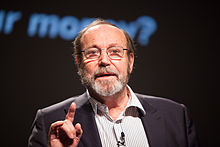Bernard Lietaer
| Bernard Lietaer | |
|---|---|

Bernard Lietaer promotes the need for monetary diversity as a means of stability diversity and complementary currencies, as a means of stability (2011).
|
|
| Born | 1942 Lauwe, Belgium |
| Occupation | Civil engineer, economist, author and professor |
Bernard Lietaer (born in 1942 in Lauwe, Belgium) is a civil engineer, economist, author and professor. He studies monetary systems and promotes the idea that communities can benefit from creating their own local or complementary currency, which circulate parallel with national currencies.
Bernard Lietaer, the author of The Future of Money: Beyond Greed and Scarcity and New Money for a New World, has been active in the realm of money systems for close to 40 years in a wide variety of functions. With the publication of his post-graduate thesis at MIT in 1971 (which included a description of "floating exchanges") and the Nixon Shock of that same year which eradicated the Bretton Woods system by unhinging the US dollar value from its gold standard and inaugurated the new era of universal floating exchanges (previous to that time the only "floating exchanges" involved some exotic currencies in Latin America), the fledgling management consultant suddenly found himself to be at the center of the financial world's attention. The techniques that he had developed for those marginal Latin American currencies were overnight the only systematic research which could be used to deal with all of the major currencies of the world. A major US bank negotiated exclusive rights to his approach which required that he begin another career. While at the Central Bank in Belgium (National Bank of Belgium) he implemented the convergence mechanism (ECU) to the single European currency system. During that period, he also served as President of Belgium’s Electronic Payment System. His consultant experience in monetary aspects on four continents ranges from multinational corporations to developing countries.
He co-founded one of the largest and most successful currency management firms; GaiaCorp, and managed an offshore currency fund (Gaia Hedge II) which was the world's top performing managed currency fund during the 1987-91 period he ran it.Business Week named him "the world’s top currency trader" in 1992.
...
Wikipedia
